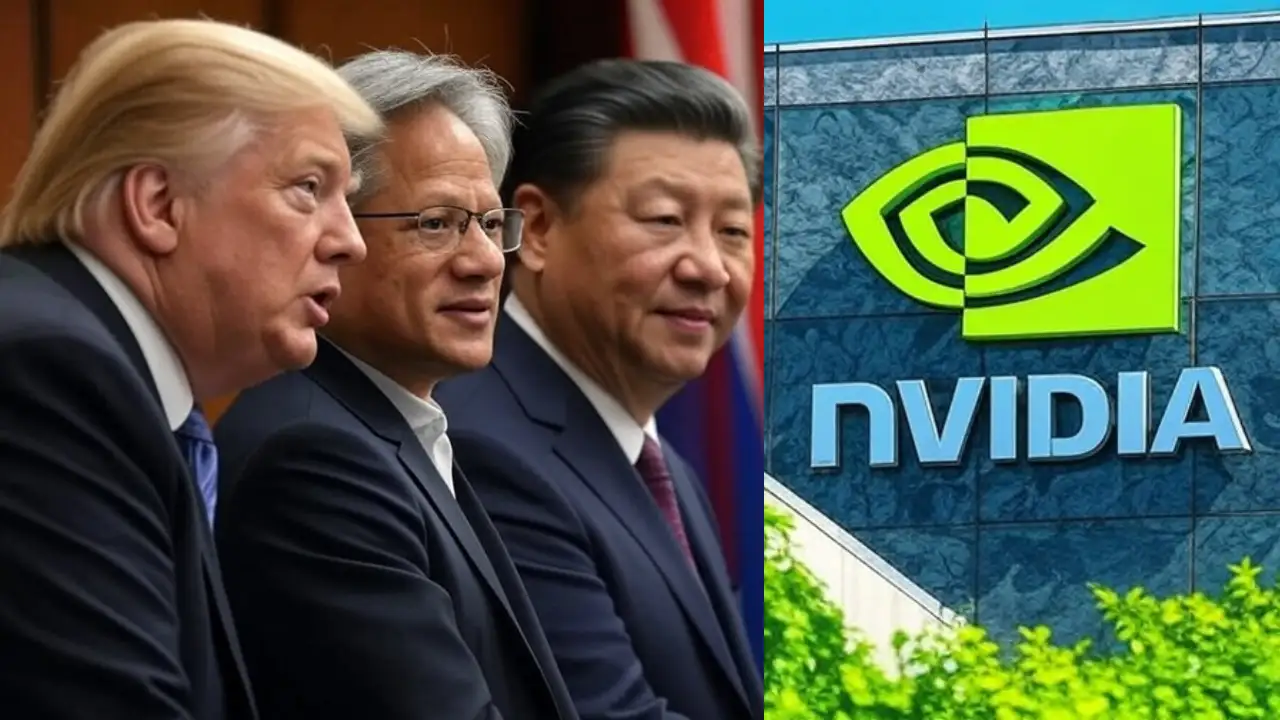$5 Billion Bet: Nvidia’s Future Hinges on US-China Tensions – Inside Jensen Huang’s Most Dangerous Gamble Yet
By Samannay Biswas
Copyright timesnownews

Nvidia CEO Jensen Huang is facing one of the most delicate balancing acts in global technology: aligning with US national interests while preserving access to China’s lucrative AI chip market. The stakes could not be higher. Nvidia, the world’s most valuable semiconductor company, sits at the heart of both America’s push to strengthen domestic chip manufacturing and China’s race to develop AI independence. Every move Huang makes—whether investing billions in US partners or negotiating with Chinese buyers—is scrutinized by governments, investors, and rivals, according to a report by the Wall Street Journal. The Intel Deal: Winning Trump’s Favor Nvidia’s recent $5 billion investment in Intel drew loud applause in Washington. The deal, struck after months of quiet talks, is framed as a commitment to building processors for data centers and personal computers within the US It aligns perfectly with President Donald Trump’s agenda to reshore semiconductor production and ensure America leads in the global AI race. Trump’s praise: On a joint video call with Intel CEO Lip-Bu Tan, Huang appeared beaming as Trump hailed the partnership as a win for US jobs and security.Government stakes: Intel has already given the US government a 10% equity share, while Nvidia agreed to hand over 15% of its China chip sales revenue. This demonstrates how tightly Washington is binding itself to the semiconductor sector.Political message: Though Intel won’t produce Nvidia’s most advanced AI training chips, the optics are clear—Nvidia is signaling loyalty to the US For Huang, the Intel deal was a calculated step to maintain goodwill with Trump, whose administration could easily block or condition future Nvidia exports. China Pushback: Nvidia’s H20 Rejection While Washington cheered, Beijing responded with hostility. This week, China directed companies not to purchase Nvidia’s H20 chip, an AI processor designed specifically for the Chinese market. Officials accused Nvidia of violating antitrust laws, but the move is widely seen as political retaliation. H20 setback: The H20, approved fr export by Trump just last month, was meant to balance US restrictions with Chinese demand. Instead, local customers—heavily influenced by government policy—are now refusing it.Huawei challenge: At the same time, Huawei unveiled a new line of AI chips that could rival Nvidia’s in China. This signals Beijing’s determination to push self-reliance and reduce dependence on US suppliers.Strategic messaging: By rejecting the H20, Beijing is showing that it won’t be forced to accept watered-down US -approved technology The Blackwell Question: Will the B30 Chip Be Allowed? Nvidia’s next-generation Blackwell architecture has become the center of geopolitical bargaining. The company has presented a scaled-down version, called the B30, to US regulators in hopes of approval for export to China. Trump’s position: Trump previously called the H20 “obsolete” and hinted that a Blackwell-based chip with 30% less power might be acceptable.National security hawks: Many Republicans in Congress remain opposed, pushing amendments like the Chip Security Act, which would require US demand to be met before exports and force chip trackers to prevent misuse.China’s leverage: Some analysts believe Beijing’s crackdowns on Nvidia are intended to pressure Washington into approving B30 exports as part of a broader trade package. If the B30 deal goes through, Nvidia could keep a foothold in China. If not, domestic Chinese firms may accelerate even faster. Washington Divided: Supporters vs. Skeptics Nvidia has powerful allies in the US , but also fierce critics. Supporters: AI czar David Sacks and senior White House adviser Sriram Krishnan argue that allowing Nvidia to sell chips to China keeps US influence strong. They warn that cutting off exports only helps companies like Huawei expand.Skeptics: Others, like Anthropic CEO Dario Amodei, argue that selling advanced chips to China is “mortgaging our future.” He believes this could become the most damaging national security decision of the Trump era.Think tanks: Experts at the American Enterprise Institute suggest Nvidia’s attempt to please all sides is becoming untenable. This split in Washington means Nvidia’s future is as much a political gamble as a business one. Beijing’s View of Jensen Huang Despite growing friction, many Chinese officials still view Huang personally as a friend. Born in Taiwan and raised in the US , he is seen as someone who understands Chinese culture and markets. Yet Beijing increasingly sees Nvidia’s dominance being weaponized by Washington. By banning certain Nvidia chips, nationalist voices in China hope to accelerate a domestic AI chip ecosystem that won’t be vulnerable to US pressure. Trump’s dismissive comments about the H20, calling it obsolete, added insult to injury. For Beijing, this reinforced the perception that US policymakers view Nvidia’s products as bargaining chips rather than neutral technology. TikTok, Trade Deals, and Nvidia’s Future Nvidia’s fate may also be tied to broader US -China negotiations. Trump and Xi Jinping are in talks over the transfer of TikTok’s US ownership—an issue with symbolic weight. Some analysts believe any deal could be linked to Nvidia’s export permissions, with the Blackwell B30 at the center of the discussion. This highlights a reality: Nvidia is no longer just a company. It is now a geopolitical asset in the US -China tech rivalry, caught between national interests and market opportunities. What’s Next for Nvidia? Jensen Huang’s balancing act is only becoming harder: Maintain US support by investing in domestic manufacturing and showing loyalty to Trump’s agenda.Protect China sales while navigating bans, rejections, and growing local competition.Stay ahead of rivals like Huawei, which are racing to develop AI chips capable of challenging Nvidia’s supremacy. Whether Nvidia continues to dominate or loses ground will depend on how Huang manages this high-wire act in the months ahead. As one analyst put it, “It’s proving untenable for the company to attempt to serve so many masters.”



